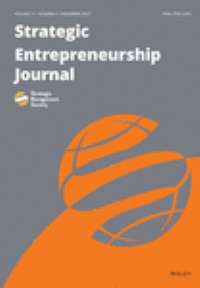Knowledge‐based theory, entrepreneurial orientation, stakeholder engagement, and firm performance
IF 5.4
2区 管理学
Q1 BUSINESS
引用次数: 29
Abstract
Research summary: Our understanding of entrepreneurial orientation (EO) is limited by the inattention to why a firm arranges itself to give rise to EO, what sets its strategic intent, and what affects its contribution to performance. These omissions have led to calls for a causally adjacent theory of EO. Grounded in knowledge-based theory, we investigated (a) how knowledge production gives rise to EO, (b) how the relationship between EO and profitability is mediated by knowledge use, and (c) how this relationship between EO and knowledge use is moderated by stakeholder engagement. Using multi-respondent, multi-source data from small-and-mid-size enterprises in two economically distinct East Asian countries, Taiwan and Japan, empirical evidence supports our theory. Our findings are consistent across both studies. We contribute a knowledge-based theory of EO. Managerial summary:Why do some firms organize to be entrepreneurial while others do not, and why do some entrepreneurially oriented firms profit more financially than others? We find that those firms that organize processes to accumulate, aggregate, activate, store, manage, and distribute knowledge become more entrepreneurial oriented as the means to create wealth from this ‘knowledge production’. In other words, knowledge production can affect perceptions of opportunities and resources, leading to choices about organizational arrangements to best use knowledge. However, we find that the firm also needs to be adept at knowledge use to profit financially from its entrepreneurial endeavors, and leading firms utilize stakeholder engagement to strengthen the relationship between entrepreneurial behavior and knowledge use on the route to greater profitability.知识基础理论、创业导向、利益相关者参与与企业绩效
研究总结:我们对创业导向(EO)的理解受到了限制,因为我们忽视了企业为什么安排自己产生EO,是什么设定了其战略意图,以及是什么影响了其对绩效的贡献。这些遗漏导致了对EO因果相邻理论的呼吁。基于知识理论,我们研究了(a)知识生产如何产生EO,(b)EO和盈利能力之间的关系如何通过知识使用来调节,以及(c)EO和知识使用之间的关系是如何通过利益相关者的参与来调节的。利用台湾和日本这两个经济上截然不同的东亚国家的中小企业的多受访者、多源数据,经验证据支持了我们的理论。我们的发现在两项研究中都是一致的。我们贡献了基于知识的EO理论。管理摘要:为什么一些公司组织起来是创业型的,而另一些公司没有,为什么一些以创业为导向的公司在财务上比其他公司利润更高?我们发现,那些组织过程来积累、聚合、激活、存储、管理和分发知识的公司,作为从这种“知识生产”中创造财富的手段,变得更加注重创业。换句话说,知识生产可以影响对机会和资源的感知,从而导致对组织安排的选择,以最佳地利用知识。然而,我们发现,企业也需要善于使用知识,才能从其创业努力中获得财务利润,而领先的企业则利用利益相关者的参与来加强创业行为和知识使用之间的关系,从而实现更大的盈利。
本文章由计算机程序翻译,如有差异,请以英文原文为准。
求助全文
约1分钟内获得全文
求助全文
来源期刊

Strategic Entrepreneurship Journal
Multiple-
CiteScore
11.10
自引率
1.60%
发文量
31
期刊介绍:
The Strategic Entrepreneurship Journal is a research journal that publishes original work recommended by a developmental, double-blind review process conducted by peer scholars. Strategic entrepreneurship involves innovation and subsequent changes which add value to society and which change societal life in ways which have significant, sustainable, and durable consequences. The SEJ is international in scope and acknowledges theory- and evidence-based research conducted and/or applied in all regions of the world. It is devoted to content and quality standards based on scientific method, relevant theory, tested or testable propositions, and appropriate data and evidence, all replicable by others, and all representing original contributions. The SEJ values contributions which lead to improved practice of managing organizations as they deal with the entrepreneurial process involving imagination, insight, invention, and innovation and the inevitable changes and transformations that result and benefit society.
 求助内容:
求助内容: 应助结果提醒方式:
应助结果提醒方式:


